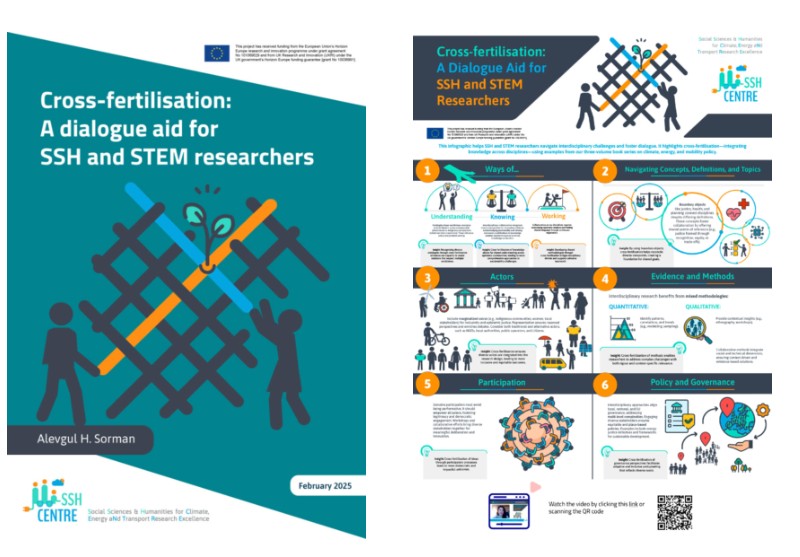SSH & STEM Collaboration
Interdisciplinary collaboration starts with dialogue — and dialogue starts with understanding. Cross-fertilisation fosters curiosity, openness, and shared learning across SSH and STEM fields. It helps research teams navigate conceptual differences, enrich problem definitions, and co-create impactful, inclusive knowledge.
Interested in turning disciplinary friction into collaborative strength? Start exploring below.
This infographic helps SSH and STEM researchers navigate interdisciplinary challenges and foster dialogue. It highlights cross-fertilisation—integrating knowledge across disciplines—using examples from our three-volume book series on climate, energy, and mobility policy.
Alevgul H. Sorman introduces Cross-Fertilisation and how it strengthens interdisciplinary research.
In this short video, Alevgul shares the motivation behind the Dialogue Aid and offers practical guidance on its use. She outlines how cross-fertilisation challenges disciplinary assumptions and why that friction is not only necessary—but generative.
Ways of Understanding, Knowing, and Working
Can we work together if we understand the world differently?
Explore how epistemological, ontological, and methodological differences shape disciplinary approaches—and how identifying them creates space for mutual learning.
Concepts, Definitions, and Topics
What happens when we use the same words but mean different things?
This section unpacks boundary objects, contested terms, and how conceptual clarity can spark cross-disciplinary breakthroughs.
Learn more about this by reading our Literature Briefs
Actors
Whose voice gets heard—and whose gets left out?
Learn why positionality, relationality, and epistemic justice are critical for inclusive and legitimate research outcomes
Engage with this by reading our SSH geographies – S and CEE Position Statement
Evidence and Methods
Can data be shared when our methods are worlds apart?
A look into methodological pluralism: how qualitative and quantitative approaches can complement one another—and what frictions to expect.
Participation
How do we make collaboration meaningful rather than symbolic?
Dive into examples of co-creation, participatory research, and challenges around integrating societal actors into knowledge production.
Find out more about different stakeholder engagement approaches by reading our Stakeholder Engagement Infosheets
Policy and Governance
Can interdisciplinary research truly shape policy?
Discover how cross-disciplinary teams contribute to actionable, inclusive policy recommendations—and where gaps still remain.
Discover this gaps in our SSH CENTRE’s Policy Recommendations


 This project has received funding from the European Union’s Horizon Europe research and innovation programme under grant agreement No 101069529 and from UK Research and Innovation (UKRI) under the UK government’s Horizon Europe funding guarantee [grant No 10038991].
This project has received funding from the European Union’s Horizon Europe research and innovation programme under grant agreement No 101069529 and from UK Research and Innovation (UKRI) under the UK government’s Horizon Europe funding guarantee [grant No 10038991].